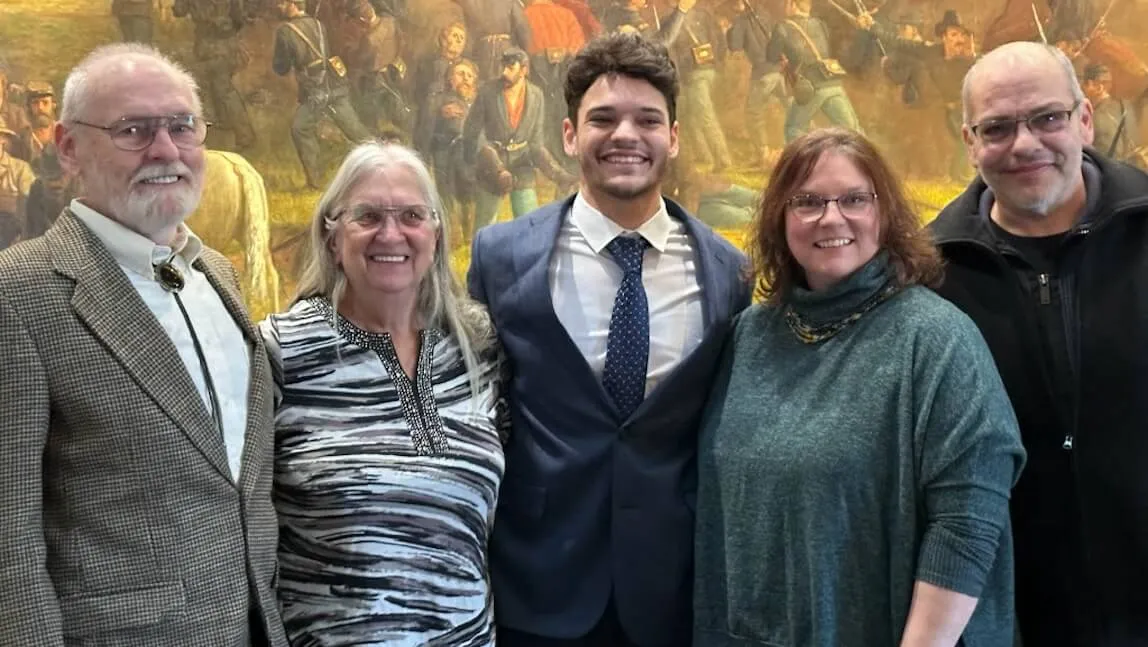For his Senior Public Communication Capstone Project, Marcus Aloisi partnered with the Burlington Partnership for a Healthy Community to help launch their Tobacco Prevention Campaign, BHS Elevate, at Burlington High School. Aloisi, along with PCOM Major Chantal Finley, conducted interviews with high school and UVM students to create a sense of understanding between high school and college age tobacco use.
“I had no idea the Capstone Project would land me in front of legislators and representatives, talking to them about why they should pass bill S.18.,” said Aloisi. On the afternoon of January 18th, Aloisi sat in the crowded conference room in Montpelier with the Vermont House Committee on Human Services. Aloisi, a first-generation college student who was born and raised in Vermont, was giving testimony on behalf of youth and young adults across Vermont to support an act banning flavored tobacco products and e-liquids in Vermont.
“What we found was astonishing,” wrote Aloisi about the information he gathered from interviewing high school and college aged students about their use of flavored tobacco. “Students understood how bad these tobacco products are for you. Yet, when questioned further, almost everyone we interviewed had some level of experience with vapes.” The findings prompted Aloisi to write op-eds for newsletters across Vermont and Northern New Hampshire discussing the public health issue. The articles caught the attention State Representative Theresa Wood, Chair of the House Committee on Human Services, who invited Aloisi to come to the committee meeting and testify.
“It’s not enough to offer the resources to quit. You have to get rid of the source – flavored tobacco products,” said Aloisi during his testimony. He shared his experience with tobacco use and the more recent experience of seeing middle school students who were experts on the flavors, the devices and the costs.
At the end of his testimony, Committee Members commended Aloisi on the importance and value of his testimony for developing the youth voice for bill S.18. “You helped us meet the gap in whom we’re hearing from,” said Representative Anne B. Donahue.
CDAE sat down with Aloisi to discuss his experience with CDAE coursework, ethics in communication, and highlights from his time at UVM.
How did your coursework and extracurricular activities contribute to your understanding of effective communication strategies in various contexts?
The most crucial action step you can take as an aspiring communications expert is to make sure you’re applying communications strategies learned - across contextual interests. I’ll give an example from my personal life. I have a deep interest in college athletics. So, in addition to taking classes like effective speaking, strategic communications, and media propaganda, I made sure to have avenues to apply the learnings. Those avenues come in all sorts of shapes and forms. It can be a meeting you set up with a department at UVM to push for a function you’d like to see. Or it could be a more formal internship that allows you to communicate and put your learnings to work.
Is speaking to the VT legislature is different than, let’s say, talking to your classmates. Do you tailor your message to a specific audience? How did you approach this task?
Yes. I’m not going to sugarcoat anything, either. It’s a lot different. I’m not saying change your whole linguistic identity. Be prepared to speak in a much different tone than you’d choose compared to a classmate. Some might be hesitant to tell you this, but I won’t. I was not their equal when I was giving that testimony. I was just a college student. I tried to wear that. I attempted to get them to understand that you don’t know what I’m telling you about my peers and my experience because we aren’t from the same generation, same social settings, or the same societal constructs in the same way, that I couldn’t comprehend half of the policy talk that is talked about in those meetings. Being an expert in my experience helped me navigate and feel confident in a room filled with politicians. Sometimes, you will be put in unequal social or professional settings. It’s up to you to find out how to manage these conversations and use your positioning to benefit yourself.
What moment are you most proud of as a CDAE major?
My most proud moment as a CDAE major was my testimony at the state house. It felt like a culmination of all of my experience within CDAE. However, my most proud moment as a college student is yet to come. I’m a first-generation college student. I feel immense pride regarding what it will feel like to walk across that stage and receive my diploma. I’m not entirely sure of the magnitude of my accomplishment yet, but that will be my proudest moment as a college student.
The Service Learning Public Communication Capstone class, led by Dr. Ben Dangl, gives public communication students the opportunity to work with non-profit and municipal community partners to develop professional level communications strategies and materials.
